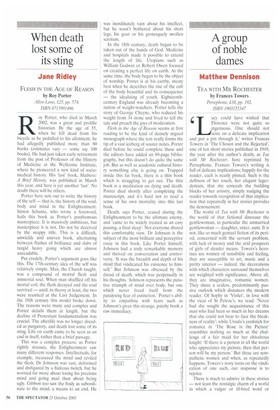When death lost some of its sting
Jane Ridley
FLESH IN THE AGE OF REASON by Roy Porter Allen Lane, £.25, pp. 574, ISBN 0713991496 Roy Porter, who died in March 2002. was a great and prolific historian. By the age of 55, when he fell dead from his bicycle as he pedalled to his allotment, he had allegedly published more than 80 books (estimates vary — some say 100 books). He had just taken early retirement from the post of Professor of the History of Medicine at the Wellcome Institute, where he pioneered a new kind of sociomedical history. His 'last' book, Madness: A Brief History, was published in March this year, and here is yet another last'. No doubt there will be others.
Porter here sets out to write the history of the self — that is, the history of the soul, body and mind in the Enlightenment. Simon Schama, who wrote a foreword, hails this book as Porter's posthumous masterpiece. It is massively ambitious, but masterpiece it is not. Do not be deceived by the snappy title. This is a difficult, unwieldy and uneven book, alternating between flashes of brilliance and slabs of turgid heavy going which are almost unreadable.
Put crudely, Porter's argument goes like this. The 17th-century idea of the self was relatively simple. Man, the Church taught, was a compound of mortal flesh and immortal soul. When man shuffled off his mortal coil, the flesh decayed and the soul survived — until, in theory at least, the two were reunited at the Last Judgement. In the 18th century this model broke down. The reasons were many and complex and Porter details them at length, but the decline of Protestant fundamentalism was crucial. The afterlife was no longer dreaded as purgatory, and death lost some of its sting. Life on earth came to be seen as an end in itself, rather than a brief passage.
This was a complex process; as Porter rightly stresses, the Enlightenment saw many different responses. Intellectuals, for example, treasured the mind and reviled the flesh. Dr Johnson was vast, deformed and disfigured by a hideous twitch, but he worried far more about losing his precious mind and going mad than about being ugly. Gibbon too saw the body as subordinate to the mind, a means to an end. He was inordinately vain about his intellect, but he wasn't bothered aboust his short legs, his gout or his grotesquely swollen scrotum.
In the 18th century, death began to be taken out of the hands of God. Medicine and hospitals made it possible to extend the length of life. Utopians such as William Godwin or Robert Owen focused on creating a perfect life on earth. At the same time, the body began to be the object of worship. Porter is at his earthy, meaty best when he describes the rise of the cult of the body beautiful and its consequence — the idealising of youth. Eighteenthcentury England was already becoming a nation of weight-watchers. Porter tells the story of George Cheyne, who reduced his weight from 34 stone and lived to tell the tale and preach the joys of moderation.
Flesh in the Age of Reason seems at first reading to be the kind of densely argued monograph where the text really forms the tip of a vast iceberg of source notes. Porter died before he could complete these and the editors have added an 80-page bibliography, but this doesn't do quite the same job. But as well as academic cultural history something else is going on. Trapped inside this fat book, there is a thin book which is struggling to get out. The thin book is a meditation on dying and death. Porter died shortly after completing the manuscript, and it's hard not to read a sense of his own mortality into this last book.
Death, says Porter, ceased during the Enlightenment to be the ultimate enemy, and 'came to be widely treated as an easy passing, a final sleep'. Not everyone shared this comfortable view. Dr Johnson is the subject of the most brilliant and perceptive essay in this book. Like Porter himself, Johnson had a truly remarkable memory and thrived on conversation and controversy. 'It was the breadth and depth of his mind that vindicated his existence to himself.' But Johnson was obsessed by the dread of death, which was perpetually in his thoughts. 'Johnson represents the putative triumph of mind over body, but one which never freed itself from the paralysing fear of extinction.' Porter's ability to empathise with fears such as Johnson's gives this strange, patchy book a raw immediacy.


































































































 Previous page
Previous page